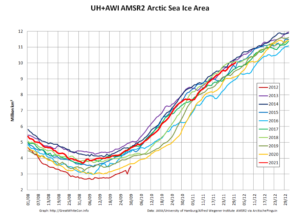by P. Homewood, Nov 27, 2021 in NotaLotofPeopleKnowThat
A new study throws doubt on the theory that Arctic warming is man made.
The Arctic Ocean has been warming since the onset of the 20th century, decades earlier than instrument observations would suggest, according to new research.
The study, published Wednesday in the journal Science Advances, found that the expansion of warm Atlantic Ocean water flowing into the Arctic, a phenomenon known as “Atlantification,” has caused Arctic water temperature in the region studied to increase by around 2 degrees Celsius since 1900.
Francesco Muschitiello, an author on the study and assistant professor of geography at the University of Cambridge, said the findings were worrisome because the early warming suggests there might be a flaw in the models scientists use to predict how the climate will change.
…
…
by Rutgers University, Dec 2, 2021 in WUWT
New Brunswick, N.J. (Dec. 1, 2021) – Using artificial intelligence techniques, an international team that included Rutgers-New Brunswick researchers have traced the evolution of coccolithophores, an ocean-dwelling phytoplankton group, over 2.8 million years.
Their findings, published this week in the journal Nature, reveal new evidence that evolutionary cycles in a marine phytoplankton group are related to changes in tropical seasonality, shedding light on the link between biological evolution and climate change.
Coccolithophores are abundant single-celled organisms that surround themselves with microscopic plates made of calcium carbonate, called coccoliths. Due to their photosynthetic activity, mineral production and widespread abundance throughout the world’s oceans, coccolithophores play an important role in the carbon cycle.
Scientists have long thought that climate changes’ effects on plants, animals and other organisms occur in cycles, which are reversed when each cycle is completed, thus erasing any small evolutionary changes during each cycle. In contrast, evolutionary changes, as known from the fossil record, are non-cyclic trends that occur over millions of years.
…
by J. Hunt, Dec 1, 2021 in TheGreatWhiteCon
Christmas is coming. Santa’s secret summer swimming pool has frozen over. The time has come for a new monthly Arctic update.
The JAXA/ADS/ViSHOP web site is undergoing maintenance for a week, so let’s start the festive season with a look at high resolution AMSR2 area and extent:

…
…
La géologie, une science plus que passionnante … et diverse

